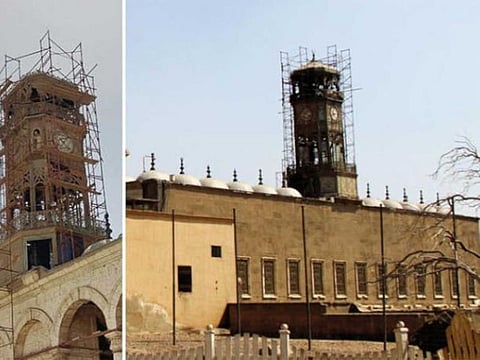Antique clock at Egypt’s Citadel of Saladin to tick again
Renovation work begins at the medieval Islamic-era fortification in Cairo

Also In This Package
Abu Dhabi: Work has begun to fix a large antique clock at the medieval Citadel of Saladin overlooking Cairo, which was gifted by the King of France to Egypt in 1845.
The clock tower is built on the walls of Mohammad Ali Mosque in the castle, but the clock has been broken since its installation in the tower, according to Dr. Mustafa Waziri, Secretary-General of the Supreme Council of Antiquities. He explained in a video posted on his Facebook account that work has started to fix the clock which was presented by Louis Philippe to the Governor of Egypt, Mohammad Ali, in response to Egypt’s dedication to France of one of the obelisks of Ramses II, which now decorates the Concorde Square in the French capital, Paris.
Waziri said, “The clock was placed on one of the walls of the Mohammad Ali mosque, but it did not work since its arrival, although three attempts were made to repair it, the last of which was during the reign of King Farouk, the 10th ruler of Egypt from the Mohammad Ali dynasty and the penultimate King of Egypt and the Sudan, succeeding his father, Fuad I, in 1936, until he was removed in 1952. Farouk died in exile in Italy in 1965.”
Dr. Abdullah Kamel, Dean of the Faculty of Archeology, Zagazig University, said, “The clock remained idle until King Farouk ordered it fixed and its tower restored, and there is a memorial plaque on the base of the tower that says During the reign of Al Faruq and under his royal decree, this tower was restored and the clock dedicated to Mohammad Ali Pasha the Great from the King of France, Louis Philippe, was repaired in 1943.”
“Egypt seeks to repair the Saladin Citidel clock, one of the oldest clocks in the world, along the lines of other famous clocks, such as Big Ben in London,” according to Waziri.
He called for French involvement during the restoration and reform, especially as the clock was a French gift, and a sign of the time-honoured relations between the two countries.
The Great Mosque of Mohammad Ali Pasha or Alabaster Mosque is situated in the Cairo Citadel and was commissioned by Mohammad Ali Pasha between 1830 and 1848.
Situated on the summit of the citadel, this Ottoman mosque, the largest to be built in the first half of the 19th century, is, with its animated silhouette and twin minarets, the most visible mosque in Cairo.
The mosque was built in memory of Tusun Pasha, Mohammad Ali’s oldest son, who died in 1816.
This mosque, along with the citadel, is one of the main landmarks and tourist attractions of Cairo and is one of the first features to be seen when approaching the city from any direction.
Meanwhile, the Ministry of Tourism and Antiquities announced the reopening of five museums, namely the Nubia Museum, Aswan, the Luxor Museum, the Egyptian Museum of Editing, the Museum of Islamic Art, and the Coptic Museum, in addition to eight archeological sites, which are the temples of Abu Simbel and Philae of Aswan, Karnak and Luxor, and Deir el-Bahari, The tombs of the Valley of the Kings in Luxor, the Giza Pyramids area, and the Salah al-Din Citadel in Cairo, within the framework of the gradual opening of tourist sites after the lockdown is relaxed.
Sign up for the Daily Briefing
Get the latest news and updates straight to your inbox









